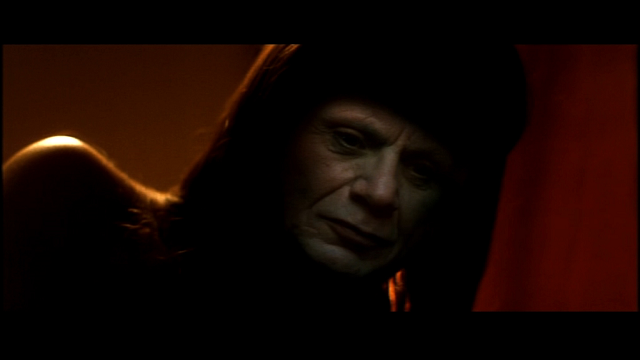To celebrate the coming of the new season of Twin Peaks, many theaters are having David Lynch retrospectives, and Seattle is one of them. Last weekend they showed Eraserhead and The Elephant Man. But, last night, they showed Lost Highway, one of David Lynch’s more…controversial films. Confusing, didactic, absurd, and abrupt, Lost Highway split audiences and critics severely during its release. Siskel and Ebert gave the film Two Thumbs Down while Kenneth Turan called it “Emotionally empty.”
To be fair, Lost Highway is a provocation. Ruminating on the postmodern cult of celebrity in the post-OJ world, David Lynch re-interpreted the OJ murder trial as a singular movie about white people. Bill Pullman is Fred Madison, a famous jazz saxophonist who lives with his gorgeous wife in a gorgeous modern house somewhere in a gorgeous residential neighborhood in LA. He has made it into a cushy successful whitebread life, even if his Nicole Brown Simpson-esque wife (Patricia Arquette) doesn’t seem to love him anymore. It’s all interrupted by a voice over the intercom announcing “Dick Laurent is dead” accompanied by a mysterious package with a video cassette showing their house. Then another infiltrating it. Then another. Until, finally, a Mystery Man appears, and Fred’s wife ends up dead.
But, wait…
On death row, Fred suffers an identity crisis and transforms into his absurdist alibi. He’s not a famous rich celebrity. He’s just Pete (Balthazar Getty), the teenage mechanic living at home with his parents. Pete doesn’t know what he did the night he ended up in jail, and nobody wants to tell him the truth. Pete’s not a murderer; Pete’s just a guy who is unfairly stalked by police officers who always suspect he’s up to no good. He had a good thing going with his girlfriend from down the block with the two-faced mafia floozy Alice (Patricia Arquette) seduces him despite his protestations. Her mafia don boyfriend, Mr. Eddy (aka Dick Laurent) is really the jealous rageaholic. Really, Alice was the dirty girl who did secret pornos and was just using Poor Ol’ Pete for his ability to steal. Pete is just a pawn in the game of Life.
As Lynch said, he was watching the OJ trials while writing this screenplay, and Lost Highway is a response to that bit of absurdity. Now, mind you, Lost Highway is not the race-sensitive response of OJ: Made in America or even American Crime Story: The People vs OJ Simpson. Instead, Lost Highway is a white dude looking at the trial devoid of race and wondering “what the hell is this crap?” This owes so much to OJ that Lynch even includes a scene of the main characters trying to evade police in a highway chase sequence. In turn, Lynch has bleached the story so that almost every character is white (Richard Pryor makes a cameo as the owner of Pete’s place of employment). By removing race from the story, the dynamics of a rich guy trying to evade a murder charge goes off the rails.
Even (especially?) without that social commentary mumbo jumbo, Lost Highway excels as a strange art house non-thriller hammered onto a neo noir LA Crime Story. Lynch adopts a consciously gothic palette, right down to the soundtrack featuring David Bowie, Marilyn Manson, Smashing Pumpkins, and Lou Reed. His set decoration resembles the cold inhumane interiors that permeated the 1990s works of David Fincher. Lost Highway might seem like it owes debts of gratitude to so many places, but, like most of Lynch’s works, it’s a unique blend of these influences that transforms the usual movie into something newer and greater. Seeing it on the big screen is a must if you haven’t done that yet.
Not so fun fact: Did you know that Lost Highway is still not available on blu ray in America? It had a nice DVD from Focus Features back in 2008. But, nothing in a higher def format.

